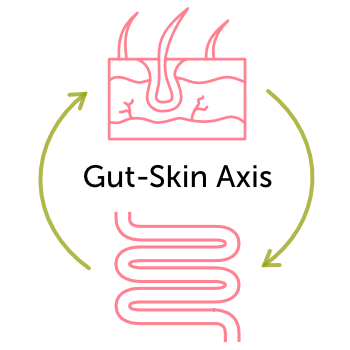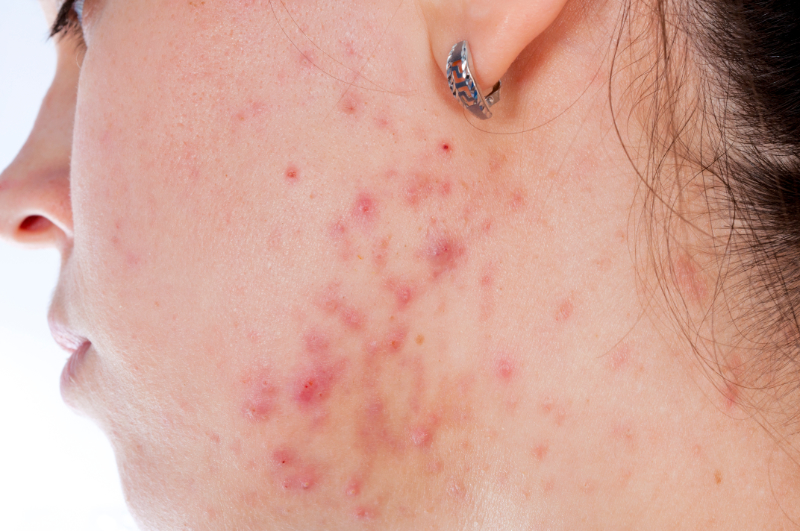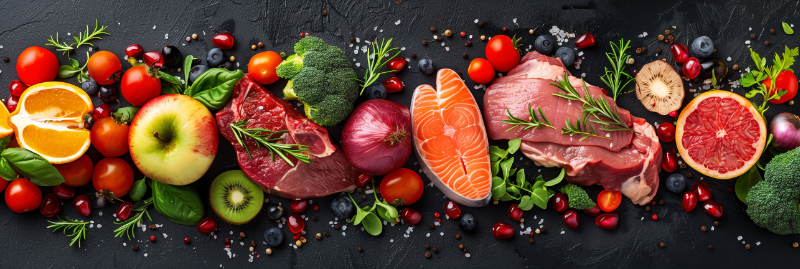The Gut-Skin Axis, the relationship between the gut and skin, and how the gut microbiome affects skin health, has been debated for years. Now research confirms that gut health plays a major role in skin function. Your skin is your largest organ, and just like the rest of your body, it depends on proper nutrition and a well-functioning digestive system to stay healthy. If your gut is struggling, your skin often reflects it, leading to many skin conditions like acne, eczema, and rosacea.

The Gut-Skin Axis: Why It Matters
Your gut microbiome—the ecosystem of bacteria in your digestive system—communicates with your skin’s microbiome. When your gut is out of balance (a condition called dysbiosis), it can lead to increased intestinal permeability, commonly known as “leaky gut.” This allows toxins, pathogens, and undigested food particles to enter the bloodstream, triggering inflammation that can manifest in the skin. Similarly, an impaired skin barrier (“leaky skin”) can result in dryness, irritation, and increased sensitivity to environmental stressors.
How Your Diet Impacts Skin Health
- Refined Sugar & Processed Foods: Diets high in sugar and refined carbs spike blood sugar levels, leading to inflammation and breakouts. Research suggests links between high dairy and sugar intake and acne. [Penso]
- Healthy Fats: Omega-3 fatty acids (found in oily fish, nuts, and seeds) strengthen the skin’s lipid barrier, reducing dryness and irritation.
- Probiotics & Prebiotics: A healthy gut microbiome supports skin health. Fermented foods like yoghurt, kefir, and kimchi introduce beneficial bacteria, while fibre-rich foods (garlic, onions, oats) help them thrive.
- Antioxidants: Found in fruits, vegetables, and green tea, antioxidants combat oxidative stress, reducing premature aging and inflammation.
- Hydration: Water plays a crucial role in maintaining skin elasticity and function. Herbal teas and water-rich foods like cucumber and watermelon can help support hydration.
Strengthening the Skin Barrier
Your skin is constantly exposed to environmental stressors like pollution, UV rays, and harsh chemicals in our environment. Over-exfoliation, aggressive cleansing, and excessive use of active ingredients can weaken the skin’s natural defenses, leading to increased irritation, dryness and breakouts.

Instead, focus on:
- Gentle, nourishing skincare: Look for products with probiotics, ceramides, and hydrating ingredients.
- Daily SPF: UV exposure weakens the skin barrier and accelerates aging, making sun protection essential 365 days a year.
- Balanced Skincare Routine: Avoid over-exfoliating or using too many active ingredients at once. Sometimes, less is more when it comes to maintaining a healthy skin barrier. Nurturing our own bodies moisturising factors to maintain a softer skin with a well maintained immune system.
Acne, Inflammation & Nutrition

Acne-prone skin often lacks essential fatty acids like linoleic acid, a key component of healthy sebum. When linoleic acid levels are low, the skin compensates by producing more oleic acid, which can enlarge sebaceous glands and contribute to breakouts. Additionally, an imbalance in the gut microbiome can increase systemic inflammation, exacerbating acne, eczema, and psoriasis.
Several studies have linked high sugar intake, dairy consumption, and processed foods to acne. A 2020 study published in The Journal of the American Medical Association found that milk, sugary drinks, and high-fat foods were associated with an increased risk of acne in adults. [Penso 2020].
Although more research is needed, these findings suggest that dietary modifications may play a significant role in improving skin health.
The Role of Probiotics in the Gut-Skin Axis & Skin Health
Probiotics, both in food and supplements, may help restore balance to the gut microbiome and reduce systemic inflammation. Specific strains like Lactobacillus and Bifidobacterium have shown promise in strengthening both the gut and skin barrier, reducing redness, irritation, and breakouts. However, probiotics work best when combined with prebiotic-rich foods like legumes, whole grains, and fibrous vegetables that feed beneficial bacteria.
Holistic Approaches to Skin Health
True skin health isn’t just about skincare products—it’s about taking a holistic approach that includes diet, lifestyle, and stress management. Chronic stress increases cortisol levels, which can compromise the gut lining and contribute to inflammation in the skin. Incorporating relaxation techniques that support vagal tone such as mindfulness, deep breathing, and yoga can support both gut and skin health.
Building a Gut-Skin Axis Supportive Diet
A skin-friendly diet should focus on whole, unprocessed foods that nourish both the gut and skin. Some key elements include:
- Healthy Fats: Avocados, nuts, seeds, and oily fish provide essential fatty acids that strengthen the skin barrier.
- Colourful Fruits & Vegetables: Rich in antioxidants, these foods help combat oxidative stress and inflammation.
- Fermented Foods: Live yoghurt, kefir, sauerkraut, kombucha, and kimchi introduce beneficial bacteria to the gut.
- Hydration: Herbal teas, water, and water-rich foods support skin hydration and elasticity.
- Protein: Meat, eggs, legumes, and plant-based sources support skin repair and regeneration.

Final Thoughts: Supporting Skin from the Inside Out
Achieving healthy, glowing skin isn’t just about what you put on your face. It is also about how you nourish your body from within. By thinking about the gut-skin axis and addressing gut health, eating a balanced diet, and choosing the right skincare routine, you can create a strong foundation for long-term skin health.
If you’re struggling with persistent skin concerns, taking a personalised approach to skincare, nutrition and lifestyle changes could be the key to unlocking better skin health.
Would you like tailored support for your skin and gut health? Let’s chat about how we can work together to find a holistic solution that works for you!
Authors: Charlotte Rye & Lisa Bhatt
Penso L, Touvier M, Deschasaux M, Szabo de Edelenyi F, Hercberg S, Ezzedine K, Sbidian E. Association Between Adult Acne and Dietary Behaviors: Findings From the NutriNet-Santé Prospective Cohort Study. JAMA Dermatol. 2020 Aug 1;156(8):854-862. doi: 10.1001/jamadermatol.2020.1602. PMID: 32520303; PMCID: PMC7287950.





